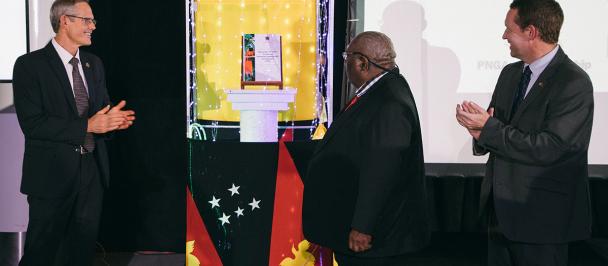A community leader making a point during the consultation process on Tasman Island. Photo: J.Poulsen/UNDP PNG
The United Nations Development Programme (UNDP) in Papua New Guinea, in partnership with the Climate Change and Development Authority (CCDA), continues to drive national climate action for remote communities.
The Building Resilience to Climate Change (BRCC) team visited a targeted number of islands and atolls in the Autonomous Region of Bougainville (AROB) conducting climate change vulnerability assessments in remote island communities.
On this leg of the 30-day sea journey, under sail during January, the BRCC mission included Nuguria, Tasman and Mortlock Island Groups, northeast of Bougainville, and Tinputz – a resettlement village on the main island for the climate change-impacted community of Carteret Islands at risk from rising sea levels affecting housing, health, food and water security.
During the mission, the AROB Administration will be briefed on the work conducted and authorities will be engaged on issues related to the impacts of climate change on outer and remote isolated islands and atoll communities.
UNDP’s Resident Representative, Mr. Dirk Wagener stated, “This work is intended to inform decision makers on the threats of climate change which are already here and impacting communities now. These efforts will result in UNDP supporting these communities deliver practical and sustainable measures to help them better adapt to these impacts that are rapidly altering the way people live.”
To date, the team have conducted assessments in Morobe, East New Britain and Manus Provinces visiting a total of 12 islands and atolls. A series of community consultations and activities are conducted, with a total of over 500 men, women and children consulted on the impacts and solutions of climate change for their communities.
The team also offers among other support, Climate Change Vulnerability Assessment training for authorities and other critical stakeholders. The team this past week conducted training in Buka Town, the capital of the Autonomous Region of Bougainville, with relevant Government authorities.
This project is a joint initiative with UNDP, the National Government of Papua New Guinea and the Asian Development Bank.

 Locations
Locations



